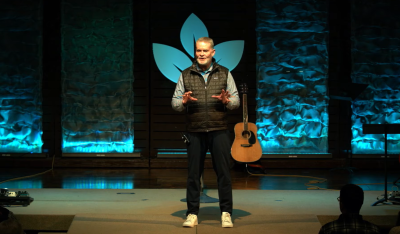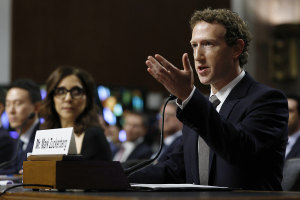Should churches allow sex offenders to hold leadership roles?

More and more frequently, reports surfaced about church leaders who have a history of sexually predatory behavior. Last week, headlines revealed that yet another church had placed a lifetime-registered child sex offender in a pastoral role, this time in Texas. News like this once seemed shocking. In today’s social climate, however, it feels almost routine.
Communities of faith are left to sort out the answers to pressing questions, starting with: Should churches allow individuals with such histories to assume leadership roles, even as volunteers?
Some argue that denying ministry roles due to past behavior equals a denial of the power of the Gospel to change sinners. Others insist that any deviation should result in a permanent ban from ministry of any kind. Where do we draw the line? How do we untangle the confusion?
One thing is certain — we cannot continue leaving this question unaddressed.
As you (and perhaps your church leadership team) navigate these issues on behalf of your own community, here are five aspects to carefully consider:
1. Platforming encourages trust in the untrustworthy
Churches, as sacred spaces, carry significant influence in shaping trust among congregants. Let’s say a church decides to reinstate a leader who has a history of harming the vulnerable, but they decide to set strict guardrails around the leader’s access to children (or women, depending on the history). Even if offenders are barred from direct contact with minors, their placement in leadership roles sends an implicit message of endorsement.
A person serving in any leadership capacity is automatically perceived as vetted and approved, making it far easier for them to manipulate unsuspecting individuals. Holding a platform of any type serves to disarm potential victims who might otherwise remain cautious. Why? Because people tend to naturally assume that a church would never endorse someone unworthy of trust.
Predators thrive in environments that grant credibility. Regardless of policies intended to mitigate contact with vulnerable individuals, churches that elevate those with known histories to positions of influence risk facilitating future harm.
ASK: Can our church community guarantee that returning this person to a ministry role will not result in undeserved trust and access to the vulnerable?
2. Leadership encourages entitlement
Leadership positions inherently grant influence and visibility — ingredients which stoke entitlement for those who crave power over others. When individuals have committed grave harm, returning to the spotlight sets the stage to reignite the patterns that led to their original offenses. A leadership platform naturally fosters ego and entitlement, reinforcing harmful tendencies rather than encouraging genuine humility and accountability. This is compounded when the leader’s history is kept quiet or downplayed.
When churches allow offenders to assume leadership roles, they inadvertently suggest that past sins carry no lasting consequences for behavior within the faith community. This mindset perpetuates the very first lie in Eden, when the serpent whispered in Genesis 3:4 that disobedience to God did not actually bring death. Exploitation and predation do indeed cause death — they murder the trust, safety, and innocence of the victim.
True rehabilitation must involve accountability and a steadfast denial of the privileges and prestige that easily enable further harm.
ASK: Can we conscientiously trust that a return to leadership in this case will not be fuel for further entitlement and ego that ultimately results in disgrace to God’s work?
3. The Church’s standards must surpass secular society
In secular professions such as medicine, a physician known to sexually assault patients would be stripped of their credentials. Why, then, should a pastor — a role requiring even greater moral accountability — be treated differently? The biblical call to live above reproach demands a higher standard than the secular world, not a lower one.
The Church, as a moral beacon, undermines its witness when it excuses behaviors that even secular society condemns. If Christians truly believe that life is sacred, that sex is sacred, and that Paul meant what he said in 1 Corinthians 5:11 and 6:18-20. If we are not to associate with those who claim to be a believer “yet indulges in sexual sin, … or is abusive. … don’t even eat with such people”, then can we biblically justify placing such an individual back into leadership? The church’s higher moral standard should not only guide decision-making but also reflect the gravity of spiritual leadership responsibilities.
When churches enable offenders to return to leadership, they fail to embody the accountability that is clearly commanded by scripture and even modeled in secular society.
ASK: Would secular society remove credentials from this person for what they have done? If so, how can we do less and still call ourselves a morally sound organization?
4. Predators cannot be trusted in leadership roles
Sexual predators are skilled deceivers, often leveraging trust and influence to manipulate the trust and vulnerability of those around them. Once a leader has demonstrated a willingness to abuse power and exploit trust, they have proven themselves unfit for leadership and disqualified themselves. By placing them back into positions of authority, churches showcase a dangerous naivete about the nature of predatory behavior patterns.
Abuse survivors are frequently dismissed with platitudes about forgiveness and grace, while abusers are handed the microphone and given standing ovations. This dynamic not only compounds the harm done but also perpetuates the ignorance and gullibility that predators rely upon.
A leader who has abused power granted to them in the past, or who has exploited the trust and privileges placed in them as a result of their position, is unlikely to change without comprehensive accountability structures — and even then, it is wisest for public leadership to remain off the table.
ASK: Does this course of action prioritize safety for those who have experienced harm, or are we focused on rehabilitating public image and protecting the position of a human we idolize?
5. Removal from leadership is not a denial of redemption
Finally, denying offenders leadership roles does not equate to denying their access to forgiveness or redemption. Earthly accountability does not limit the reach of the gospel, nor does it hedge the transforming power of conversion. Redemption is a matter between the individual and God. Churches can support the spiritual growth of offenders without granting access to ministry platforms that risk endangering others.
By permanently barring predatory offenders from leadership roles, churches affirm that both forgiveness and accountability can coexist. Leadership, however, is not a right — it is a sacred trust. No human possesses an innate entitlement to any role of authority or influence. These roles must be earned through lasting trustworthy behavior, and they should be revoked when patterns of action destroy trust. This distinction ensures that safety and justice are prioritized without precluding opportunities for personal repentance and restoration in other areas.
ASK: How can we support the journey of repentance in this situation, without compromising the safety of the lambs or collaborating in a dynamic where we endanger this leader’s ability to recover by putting power back in their hands?
The theology of accountability
Scripture repeatedly underscores the importance of accountability for leaders. James 3:1 warns that teachers will be judged more strictly, and 1 Timothy 3:2 states that overseers must be “above reproach.” Leadership in the church is not a privilege but a weighty responsibility that demands the utmost integrity.
Can any church place someone with a history of sexual offenses in leadership without contradicting these biblical principles? Even if a person appears to show remorse, how can a community truly know that it is not merely the manipulative tactics of a skilled deceiver at work? What steps can be taken to avoid conveying the message that the church prioritizes grace for offenders over justice for victims — a dangerous and unscriptural imbalance?
The Church’s role in protecting the vulnerable
Jesus was clear about the gravity of exploiting the innocent, saying, “If anyone causes one of these little ones … to stumble, it would be better for them to have a large millstone hung around their neck” (Matthew 18:6).
Should the church not also embody this protective stance, creating an environment where the vulnerable are safe and supported?
Allowing sex offenders into leadership positions risks retraumatizing survivors, creates wide-open opportunities for recidivism, and undermines the trust of congregants. If we wish to align with scripture, then leadership should only be entrusted to those whose lives align with the high moral standards expected of shepherds.
This stance is not about withholding grace or forbidding second chances; it is about safeguarding the sacred trust placed in spiritual leaders. It is about honoring the survivors who look to the church for safety and upholding the integrity of the Gospel message.
If the community of faith wishes to follow the mandate of Scripture, then churches must prioritize the protection of the vulnerable, set higher standards for leadership than secular institutions, and ensure that forgiveness is not conflated with exemption from accountability. By doing so, we not only protect our congregations but also preserve our witness as communities faithfully rooted in doing justice, loving mercy, and walking humbly (Micah 6:8).
Sarah McDugal is an author, speaker, abuse recovery coach, and co-founder of Wilderness to WILD & the TraumaMAMAs mobile app. She creates courses, community, and coaching for women recovering from deceptive sexual trauma, coercive control, and intimate terrorism.




























